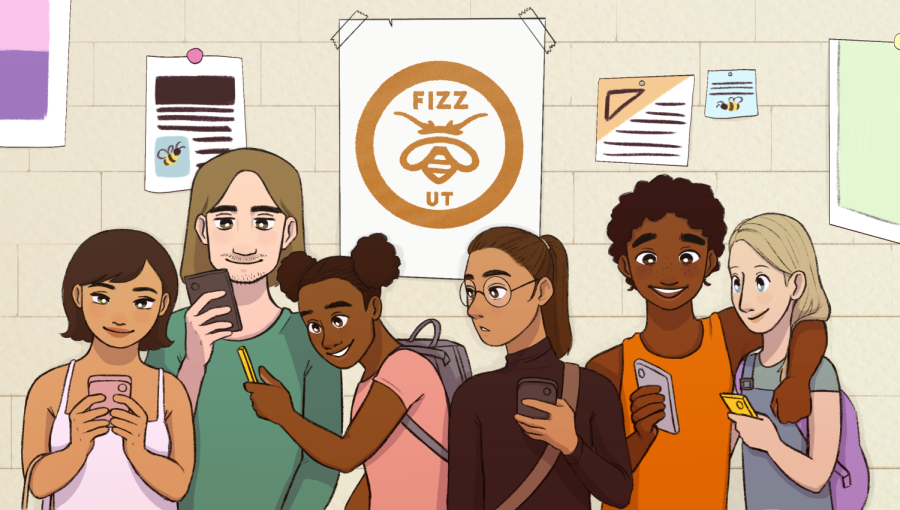New anonymous social media app comes to UT
February 25, 2022
Editor’s Note: This article first appeared in the Feb. 21, 2022 in the flipbook.
On Feb. 10, UT became the third university to join the new anonymous social media app Fizz.
Founders Teddy Solomon and Ashton Cofer had the idea for Fizz in November 2020 as an anonymous, positive forum for college students. Solomon said they created the app because when they attended Stanford as freshmen, they had difficulty connecting with other students.
“The main thing we noticed … at college communities as a whole, there was a lack of a centralized platform … if you wanted to go on and connect to the whole student body,” Solomon said.
On Fizz, students can anonymously share messages, polls and photos. Solomon said students can use the app to learn about events on campus or meet new people. Tiffany Hoang, one of Fizz’s lead ambassadors at UT, described the app as a mixture of Reddit and Twitter.
Fizz’s founders launched the app at Stanford in July, but it has been introduced at three other institutions since: UT, Rutgers and Arizona State University. Each institution has their own Fizz domain — only students with a UTmail account can join UT’s domain.
“We chose UT because it’s a vibrant community where there seemed to be a big need for a centralized platform that was safe and respectful,” Solomon said in an Instagram message.
Hoang, a health and society sophomore, said students were excited about the app and its merchandise when she was promoting Fizz’s launch.
On Feb. 10 and 11, ambassadors handed out hoodies and bucket hats to students who downloaded Fizz. Psychology senior Chad Youmans had a more skeptical view of the app. He said using free stuff to get people to download an app is a questionable business practice.
“If you’re going to market your product and market your platform, do it on the strength of your product,” Youmans said.
Nicholas Grammer, a biomedical engineering and African and African diaspora studies freshman said because the app is only available on iOS, he downloaded the app to get a hoodie for his friend who has an Android. He said the anonymity makes it easy for people to be authentic.
“Anonymity has its ups and downs,” Grammer said. “People can just be who they want to be … which can be dangerous, but at the end of the day, we do that all the time with normal social media.”
Youmans said the anonymity aspect can make forming connections more difficult.
“If you are going to make an app that is exclusively for students of a particular university, I think that you’re really missing out by not having a more personal aspect of it,” Youmans said. “If everything’s anonymous, there will always be a little wall in between every connection you make.”
To ensure that anonymity does not lead to toxicity, Solomon said they employ 20 student moderators. Their goal is to respond to reported posts within two minutes.
“Having these moderators who are students in the community, who understand it, enjoy jokes (and) who know the discourse of what’s going on on the app,” Cofer said. “We found it’s all about setting the culture at the beginning.”












